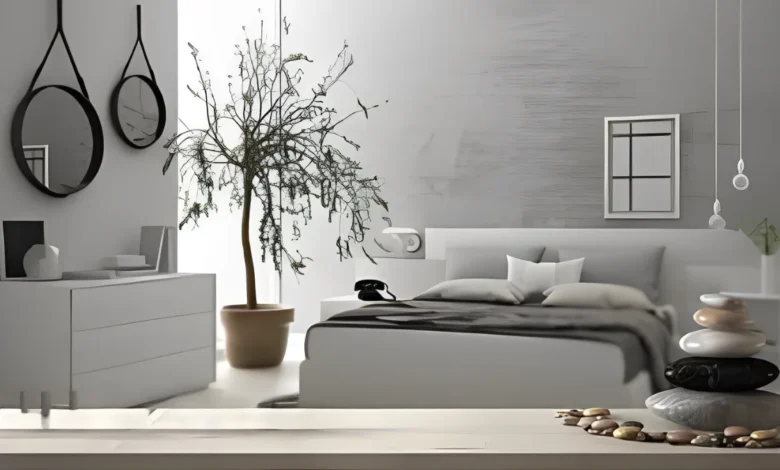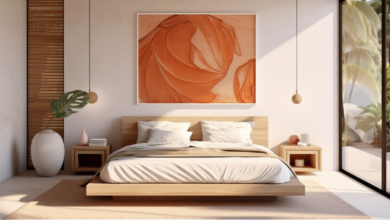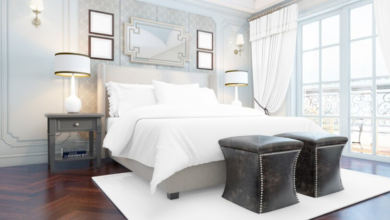Feng Shui Bedroom Tips for Harmonious Energy Flow

Introduction to Feng Shui Bedroom Tips
Welcome to our comprehensive guide on creating a harmonious and energetically balanced bedroom using the principles of Feng Shui. In this blog post, we will explore how understanding and implementing Feng Shui can enhance the energy flow in your bedroom, leading to a more peaceful and rejuvenating space.
Understanding the Essence of Feng Shui
Feng Shui is an ancient Chinese practice that focuses on harmonizing the energy, or Qi, in our living spaces. By creating a balanced and positive environment, Feng Shui aims to promote well-being and improve various aspects of our lives, including sleep quality, relationships, and overall health.
How Feng Shui Enhances Your Bedroom’s Energy Flow
The bedroom is one of the most important areas in our homes, as it is where we recharge, relax, and nurture our bodies and minds. Incorporating Feng Shui principles into your bedroom design can significantly improve its energy flow, creating a serene and soothing atmosphere conducive to restful sleep and rejuvenation.
Exploring the Benefits of Feng Shui in Your Bedroom
Before diving into specific tips and techniques, let’s explore the benefits of incorporating Feng Shui into your bedroom:
- Improved sleep quality: Feng Shui helps create a calm and balanced environment, promoting better sleep and reducing insomnia and restlessness.
- Increased energy levels: By optimizing the energy flow in your bedroom, Feng Shui can enhance vitality and overall well-being.
- Enhanced relationships: Feng Shui principles can improve the harmony between couples sharing a bedroom, fostering deeper connections and communication.
- Stress reduction: A well-balanced and harmonious bedroom can reduce stress levels and promote relaxation.
- Increased abundance and prosperity: Feng Shui aims to align your living space with abundance and prosperity, allowing for a more abundant and fulfilling life.
Now that we understand the benefits, let’s dive into the practical tips for creating a harmonious Feng Shui bedroom.
Setting the Foundation: Layout and Placement
Arranging Furniture for Optimal Energy Flow
To begin creating a harmonious bedroom, it’s essential to consider the layout and placement of furniture. Here are some key tips:
- The Bed: Placing the Central Element
- Position the bed in the commanding position diagonally across from the door, ensuring a clear view of the entrance.
- Avoid placing the headboard against a wall shared with a bathroom or above a stairwell.
- Positioning Nightstands and Dressers
- Place nightstands on either side of the bed to promote balance and symmetry.
- Ensure there is ample space around dressers and other furniture for easy movement and energy flow.
- Achieving Balance with Other Furniture
- Avoid cluttering the bedroom with excessive furniture, as it can disrupt the flow of energy.
- Choose furniture with rounded edges instead of sharp corners to create a softer and more inviting atmosphere.
Balancing Elements for a Harmonious Atmosphere
To create a harmonious Feng Shui bedroom, it is crucial to balance the five elements:
- Incorporating the Five Elements
- Earth: Introduce earthy tones and materials, such as beige or brown colors, terracotta pots, and natural fibers.
- Water: Add serene colors like blue or black and reflective surfaces like mirrors or glass to represent the water element.
- Fire: Enhance the ambiance with warm lighting, such as soft yellow or orange hues, candles, or salt lamps.
- Wood: Introduce natural and organic elements, such as wooden furniture, plants, or bamboo accents.
- Metal: Incorporate metallic accents through decorative items, such as metal picture frames or sculptures.
Maximizing Space and Clutter Control
Creating a clutter-free and organized bedroom is essential for optimal energy flow. Here are some tips:
- Decluttering for a Peaceful Environment
- Organize personal belongings and remove unnecessary items from your bedroom.
- Store items neatly in closets, drawers, or under-bed storage solutions.
- Optimizing Space with Mirrors
- Strategically place mirrors to reflect natural light and create a sense of spaciousness.
- Avoid positioning mirrors that directly face the bed, as it can disrupt sleep.
- Enhancing Natural Light and Air Circulation
- Keep windows unobstructed to allow natural light to fill the room.
- Ensure proper air circulation by opening windows or using fans to promote fresh energy flow.
Colors, Textures, and Materials: Creating a Tranquil Aura
Choosing Calming Color Palettes
The colors in your bedroom can significantly influence the energy and mood of the space. Here are some suggestions:
- Serene blues for relaxation
- Shades of blue, such as soft sky blue or tranquil navy, promote a sense of calm and relaxation.
- Soft Neutrals for a Soothing Ambience
- Light shades of neutral colors, like beige or cream, create a peaceful and soothing atmosphere.
- Earthy Tones to Ground the Energy
- Earthy tones, like warm browns or soft greens, provide a grounding and nurturing feel to the bedroom.
Incorporating Textures for Sensory Balance
Textures play a vital role in creating a balanced and sensory-rich environment. Consider the following:
- Introducing Soft Fabrics and Upholstery
- Choose soft and cozy fabrics for bedding, curtains, and upholstery to create a comfortable and inviting atmosphere.
- Harmonizing with Natural Materials
- Incorporate natural materials like wood, stone, or rattan to bring the soothing energy of nature into your bedroom.
- Balancing Smooth and Rough Textures
- Combine smooth textures, such as silk or satin, with rougher textures, like a textured throw or rug, for a harmonious blend.
Enhancing Feng Shui through Bed Linens and Fabrics
The choice of bed linens and fabrics can significantly impact your sleep quality and overall well-being. Consider the following:
- Optimal Bedding Colors and Patterns
- Choose calming colors and patterns, such as floral or nature-inspired designs, to promote relaxation and tranquility.
- Selecting High-Quality and Natural Fibers
- Opt for high-quality bedding made from natural fibers like organic cotton or bamboo for breathability and comfort.
- Incorporating Comforting Fabrics for a Restful Sleep
- Use soft and breathable fabrics for pillows and blankets to enhance the comfort of your sleep.
Elements of Relaxation: Creating a Peaceful Haven
Harnessing the Power of Scent and Sound
Scent and sound can significantly impact our mood and create a peaceful atmosphere. Consider the following tips:
- Essential oils and aromatherapy
- Choose relaxing scents like lavender, chamomile, or jasmine to promote calmness and restful sleep.
- Utilize diffusers or candles to disperse the scents throughout the bedroom.
- Soothing Sounds for Better Sleep
- Invest in a white noise machine to help mask disruptive sounds and promote deeper sleep.
- Play ambient nature sounds, such as rain or ocean waves, to create a tranquil environment.
Adding Greenery and Natural Elements
Bringing nature into your bedroom can enhance its overall energy and air quality. Consider the following tips:
- Plants for Improved Air Quality and Freshness
- Choose low-maintenance bedroom plants, such as snake plants or peace lilies, to purify the air and add a touch of nature.
- Select Feng Shui-friendly plant choices that symbolize abundance and positive energy, such as lucky bamboo or money plants.
- Natural Materials and Biophilic Design
- Incorporate wood and stone elements, such as a wooden headboard or bedside table, to bring warmth and grounding energy.
- Hang energizing artwork inspired by nature, such as landscapes or botanical prints, to create a harmonious environment.
Creating a Personalized Sanctuary
Make your bedroom a reflection of your personal style and preferences. Consider the following tips:
- Reflecting Personal Style in Decor
- Choose decor items that resonate with your individual taste and bring you joy, such as artwork, photographs, or cultural elements.
- Encouraging Relaxation with Cozy Seating
- Create a cozy seating area, such as a comfortable armchair or reading nook, to encourage relaxation and quiet reflection.
- Incorporating personal mementos and treasured items
- Display sentimental objects and mementos that hold positive emotional significance to create a sense of comfort and happiness.
Sleep Support: Designing for Optimal Rest
Selecting the Right Mattress and Bedding
The quality of your mattress and bedding directly affects your sleep comfort and quality. Consider the following tips:
- Finding the Ideal Mattress Firmness
- Choose a mattress firmness that suits your individual preferences and provides proper support for your back and body.
- The importance of supporting pillows and bedding
- Invest in supportive pillows that align your spine and neck for optimal comfort.
- Use high-quality bedding and mattress protectors to enhance hygiene and comfort.
- Promoting Healthy Sleep Posture
- Experiment with different sleeping positions and pillow supports to find the most comfortable and aligned posture for sleeping.
Optimizing Bedroom Lighting
Lighting plays a crucial role in creating a relaxing and restful ambiance in your bedroom. Consider the following tips:
- Balancing natural and artificial light
- Control room darkening and light filtering with curtains or blinds to create a sleep-conducive environment.
- Utilize adjustable lighting solutions, such as dimmer switches or lamps with adjustable brightness, to create a soothing atmosphere.
- Ensuring Proper Lighting for Different Activities
- Install task lighting, such as bedside lamps or reading lights, for specific activities like reading or working in bed.
Promoting a Mindful Sleep Routine
Establishing a mindful sleep routine can significantly improve your sleep quality and overall well-being. Consider the following tips:
- Establishing a Technology-Free Zone
- Keep electronic devices, such as smartphones or tablets, out of the bedroom to minimize distractions and promote restful sleep.
- Implementing Relaxing Pre-Bedtime Rituals
- Develop a pre-bedtime routine that includes activities like reading, light stretching, or journaling to unwind and prepare for sleep.
- Encouraging a Peaceful and Consistent Sleep Schedule
- Maintain a consistent sleep schedule by going to bed and waking up at the same time each day to regulate your body’s internal clock.
Conclusion to Feng Shui Bedroom Tips
Incorporating Feng Shui principles into your bedroom design can greatly enhance the energy flow and create a harmonious and peaceful sanctuary. By following the tips and techniques outlined in this guide, you’ll be able to transform your bedroom into a haven of tranquility and rest. Embrace the power of Feng Shui and embrace the positive energy that awaits you in your newly harmonized bedroom.
Read more: Room Design Tool: Transform Your Space Creatively
FAQs to Feng Shui Bedroom Tips
Below are some frequently asked questions about Feng Shui in the bedroom:
- Does Feng Shui always require major renovations?
- No, Feng Shui can be implemented through simple adjustments and mindful choices in furniture arrangement, colors, and decor.
- Can I incorporate Feng Shui principles into a small bedroom?
- Absolutely! Feng Shui principles can be applied to any size of bedroom, regardless of its dimensions.
- How long does it take to feel the effects of Feng Shui in the bedroom?
- The effects of Feng Shui in the bedroom can vary from person to person. Some individuals may notice immediate improvements, while others may experience gradual changes over time.
- Are there any Feng Shui remedies for insomnia?
- Yes, Feng Shui offers various remedies for insomnia, such as incorporating relaxing colors, optimizing lighting, and creating a clutter-free environment.
- Can I apply Feng Shui principles to a shared bedroom?
- Certainly! Feng Shui principles can be applied to shared bedrooms by ensuring equal representation and balance for each person’s energies and preferences.



